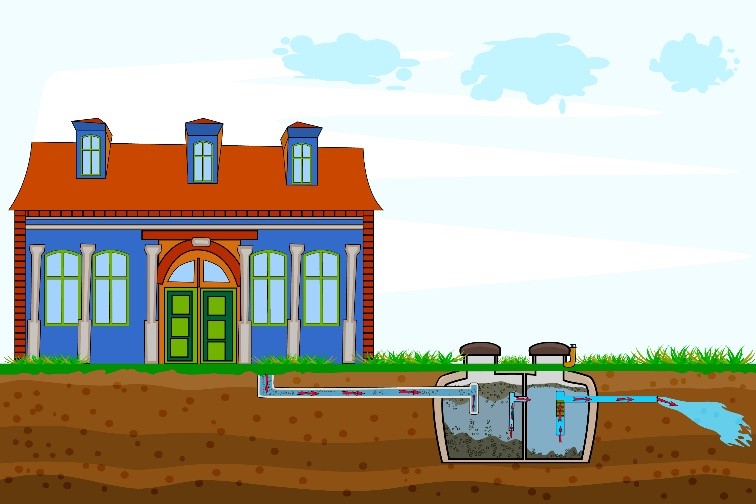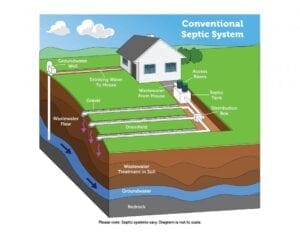According to data from the Pennsylvania Department of Environmental Protection, which sets requirements for private septic systems, approximately 26% of PA households have an on-lot septic system for sewage disposal today. Typically, if your property is located beyond town or city limits here in the Commonwealth, you will not have municipal sewer service. However, the good news is, having a septic system instead can be an extremely low-cost solution when it’s properly maintained.
But let’s take a step back for a second. Before you can understand your residential septic system’s maintenance needs, you must understand the basics of how it works. Today’s blog post introduces a few of the most common types of home septic systems that you might potentially have, as well as the general operating principle of these sewage management structures.
How the Most Popular Types of Home Septic Systems Work
Nearly all residential septic systems contain three main components:
- a central sewage drain pipe that carries all wastewater and solids from your home
- a septic tank, which is a water-tight container where solid waste settles to the bottom and scum (fats, oils, grease) floats to the top, remaining contained
- a drainfield where wastewater leaving the septic tank percolates into the soil, naturally filtering out harmful substances and returning “treated” water back into the groundwater
Conventional Septic Systems
In conventional septic systems, which are the most common type, wastewater will spread evenly across the drainfield after passing through a distribution box.
The drainfield itself may be constructed in a variety of ways, though it often incorporates gravel or stone in a shallow underground trench. This diagram from the United States Environmental Protection Agency (EPA) shows the construction of a conventional septic system.
Mound Systems for Shallow Soil Sites
If you live in an area with shallow soil/bedrock or high groundwater, you may require a mound septic system—often called a “sand mound.” These systems incorporate pumps that help wastewater move into a sand-containing structure that can adequately filter it.
Mound systems will typically require more maintenance than conventional systems since they contain mechanical pumping devices. They also take up more physical space on your property, but they can allow you to live somewhere you love—even if that location has difficult geology or soil conditions.
Cluster/Community Systems
Sometimes, small clusters of rural homes or buildings on a business’s property will share a drainfield and wastewater dispersal components. Each home or building will still have its own septic tank, but the shared nature of other system components may mean you will have to cooperate with neighbors to keep everything functioning correctly.
Other Septic System Types
Note that there are several other types of septic systems, including some that do not have a drainfield, but only a holding tank that must be pumped frequently. If you’re not sure what type of system you have today, we encourage you to get in touch with us here at Biros. We have a line and tank locating service and are also happy to explain the details of your specific septic system.
It is also essential to remember that even for new home construction, you will not have much input on the type of septic system that is appropriate for your home. Your municipality’s sewage enforcement officer will help decide the type of septic system your home can have. This will depend on many factors, including the soil depth to bedrock or groundwater on your property, how quickly water moves through the soil, and the soil type and texture.
Why Septic System Cleaning/Pumping Is Required
Septic system maintenance mainly revolves around pumping out the closed container that is the septic tank, which will eventually become full of the solid waste from your home. If you do not have your septic tank pumped out regularly, your system will begin malfunctioning, which can lead to sewage backing up into your home, foul odors around the tank and drainfield outdoors, or the appearance of ooze and muddy conditions around the drainfield or tank location.
A poorly maintained septic system will create unnecessary expenses and mess for you, and it can result in fines from your local municipality or other authorities.
How Often You Need To Pump Your Septic System?
The average household septic system should be inspected at least every three years by a septic service professional. Household septic tanks are typically pumped every three to five years. Alternative systems with electrical float switches, pumps or mechanical components should be inspected more often, generally once a year. A service contract is important since alternative systems have mechanized parts.
Four major factors influence the frequency of septic pumping:
- Household size
- Total wastewater generated
- Volume of solids in wastewater
- Septic tank size
If your septic system serves a large number of people, you may want to have it pumped more regularly. An experienced and trustworthy septic services provider like us here at Biros Septic & Drain Cleaning, Inc. can inspect your system and advise you on the best maintenance schedule for your needs.
Don’t want to worry about forgetting to schedule a pump-out? Look for preventative maintenance programs—like the No Hassle Maintenance Program we offer—to help you keep track of your ongoing septic pumping and maintenance records.
Looking for Septic Tank Services Near Scranton, PA?
Whether you’re building a new home and looking for septic system installation service or you simply need a regular pump-out, Biros Septic & Drain Cleaning, Inc. is your best resource throughout the Pennsylvania counties of Carbon, Columbia, Clinton, Luzerne, Lackawanna, Lycoming, Monroe, Montour, Northumberland, Schuylkill, Snyder, Sullivan, Union, and Wyoming. We provide PSMA and NOF certified inspections and can help you submit any and all paperwork to your local sewage enforcement officer to prove your compliance with DEP and local regulations. Give us a call today with questions or to schedule your septic system service!


